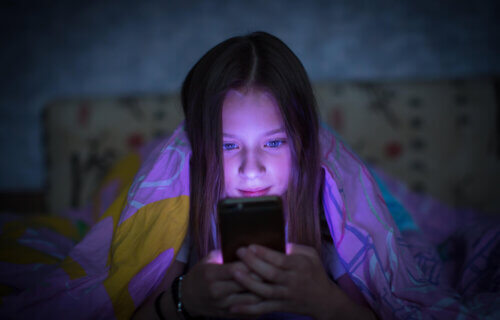PROVO, Utah — Does staring into a smartphone screen not only hurt your eyes, but then keep you up all night? That pesky blue light digital screens emit can be a real problem for human health, which led tech giants to create Night Shift. Although this feature is supposed to help users sleep better, a new study finds that’s not the case. Researchers from Brigham Young University say sleep quality among smartphone users is no different with or without Night Shift on.
Previous studies point to blue light from digital devices disrupting melatonin levels and sleep cycles. To address this, Apple introduced Night Shift to iOS in 2016. The program adjusts a user’s screen colors to display warmer hues after sunset. Android phones quickly developed their own night modes to address complaints about smartphone light affecting sleep.
Until now, however, claims that Night Shift really improves sleep over regular cell phone use had been theoretical. The put these claims to the test, researchers compared sleep outcomes among three groups. The first two either used their phones at night with or without Night Shift activated. The third group did not use a smartphone before bed at all.
“In the whole sample, there were no differences across the three groups,” says BYU’s Chad Jensen in a university release. “Night Shift is not superior to using your phone without Night Shift or even using no phone at all.”
Does sleeping less limit the impact of smartphone light?
Jensen and researchers from Cincinnati Children’s Hospital Medical Center followed 167 young adults between 18 and 24 during this study. Each participant said they use their cell phone daily.
Researchers asked the groups to spend at least eight hours in bed while wearing an accelerometer to record sleep activity. Participants using smartphones also had an app installed to monitor phone usage during the experiment. Study authors measured various sleep outcomes, including sleep length, quality, and time to took to fall asleep.
Overall, the results show no differences between the groups, even the ones not using a phone before bed. However, the team then split the groups into two different categories; one sleeping for about seven hours each night and other sleeping for less than six.
The study finds those sleeping closer to the recommended eight hours a night displayed some differences in sleep quality based on their phone usage. Participants not using a phone before bed experienced better sleep quality than both smartphone groups.
In the six-hour group however, results show no differences between non-phone users, those using Night Shift, or those using a phone without the feature.
“This suggests that when you are super tired you fall asleep no matter what you did just before bed,” the BYU psychology professor explains. “The sleep pressure is so high there is really no effect of what happens before bedtime.”
Is it the blue light or your brain keeping you up?
Researchers add the results suggest blue light may not be all to blame for nighttime insomnia. Jensen says the psychological engagement created by texting, web browsing, and playing games also contributes to keeping your brain awake.
“While there is a lot of evidence suggesting that blue light increases alertness and makes it more difficult to fall asleep, it is important to think about what portion of that stimulation is light emission versus other cognitive and psychological stimulations,” Jensen adds.
Therefore, study authors conclude Night Shift may make your screen darker, but don’t count on a better night’s sleep because of it.
The study appears in the journal Sleep Health.
